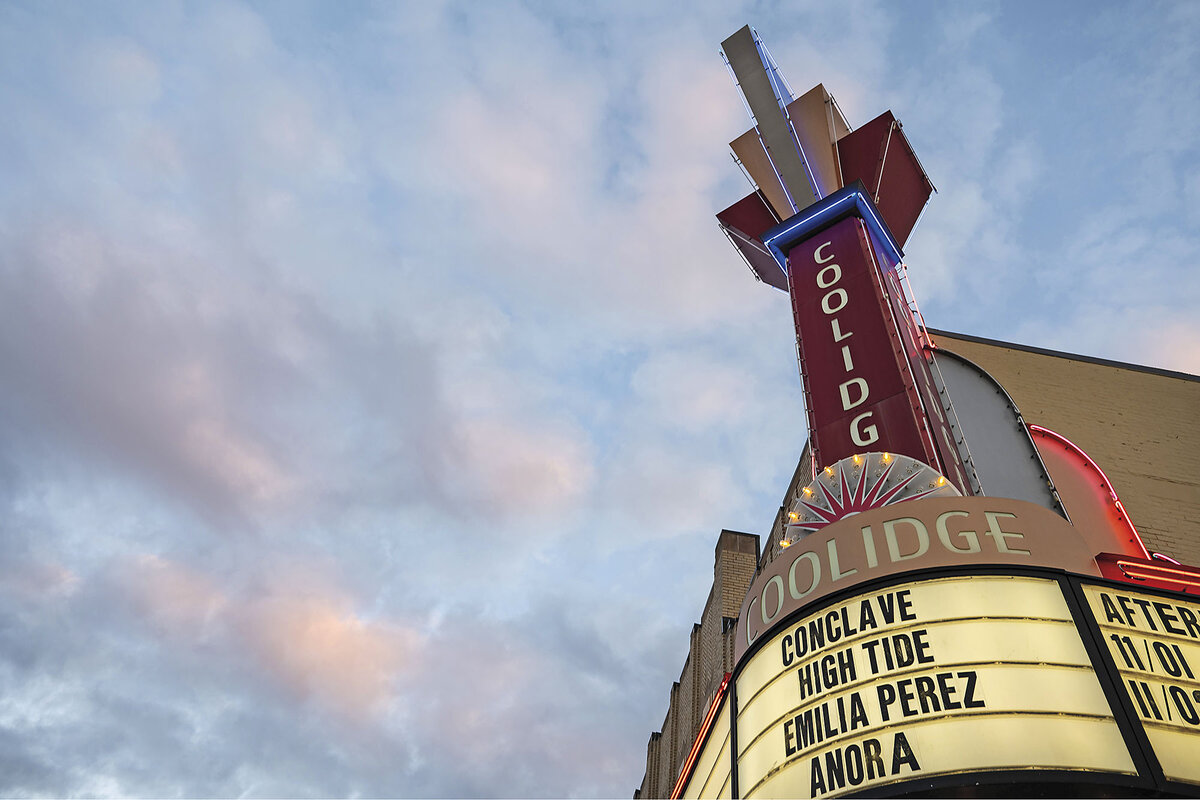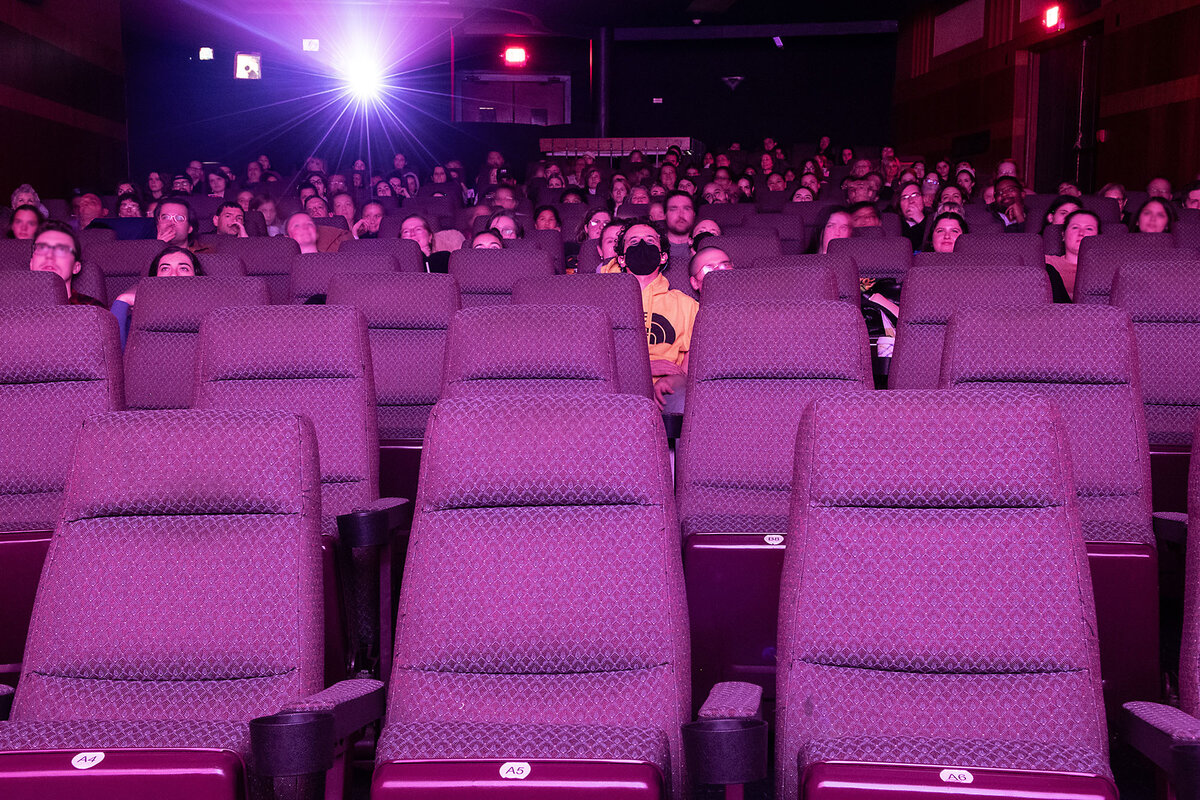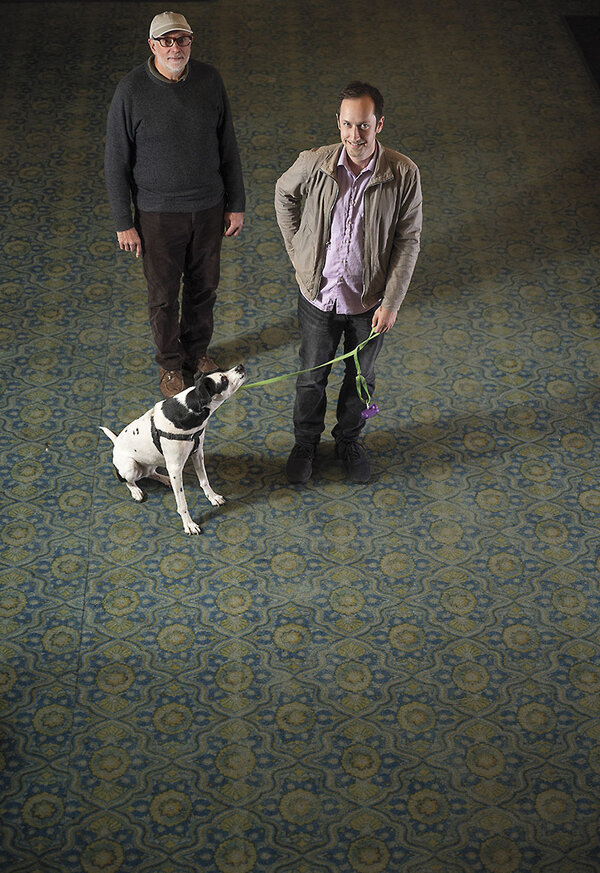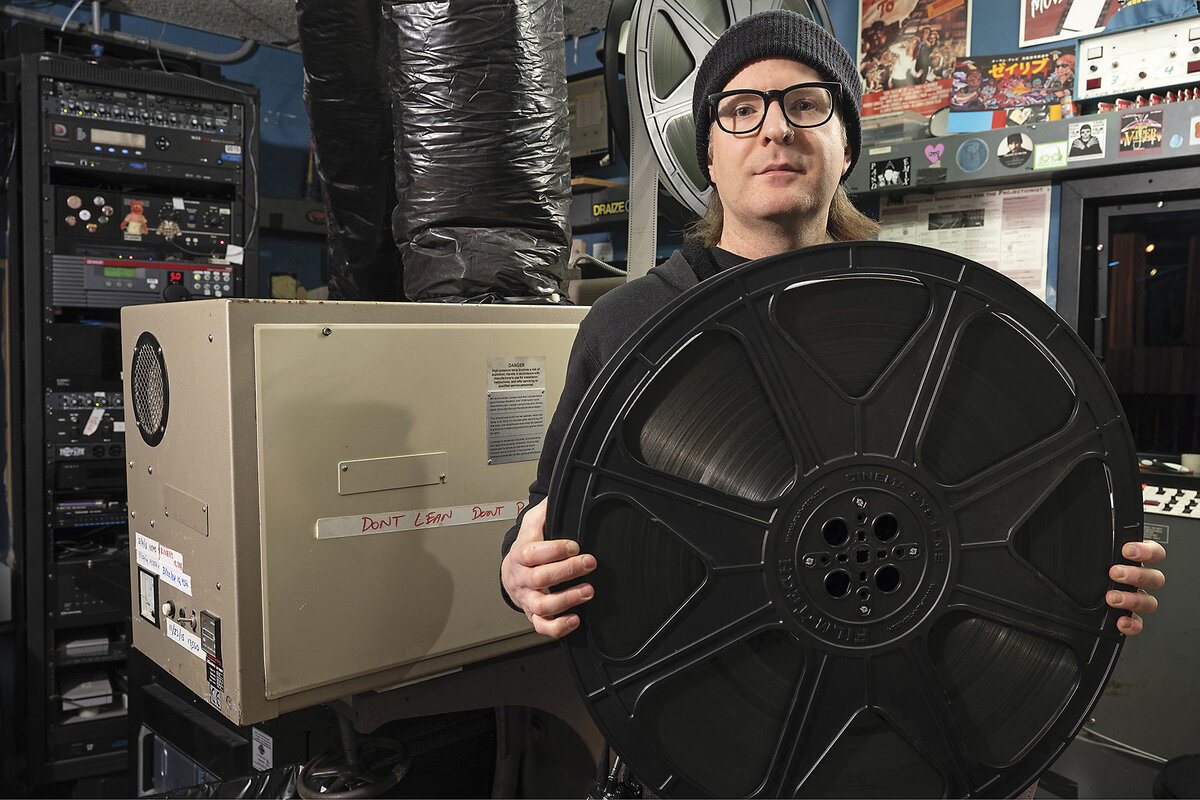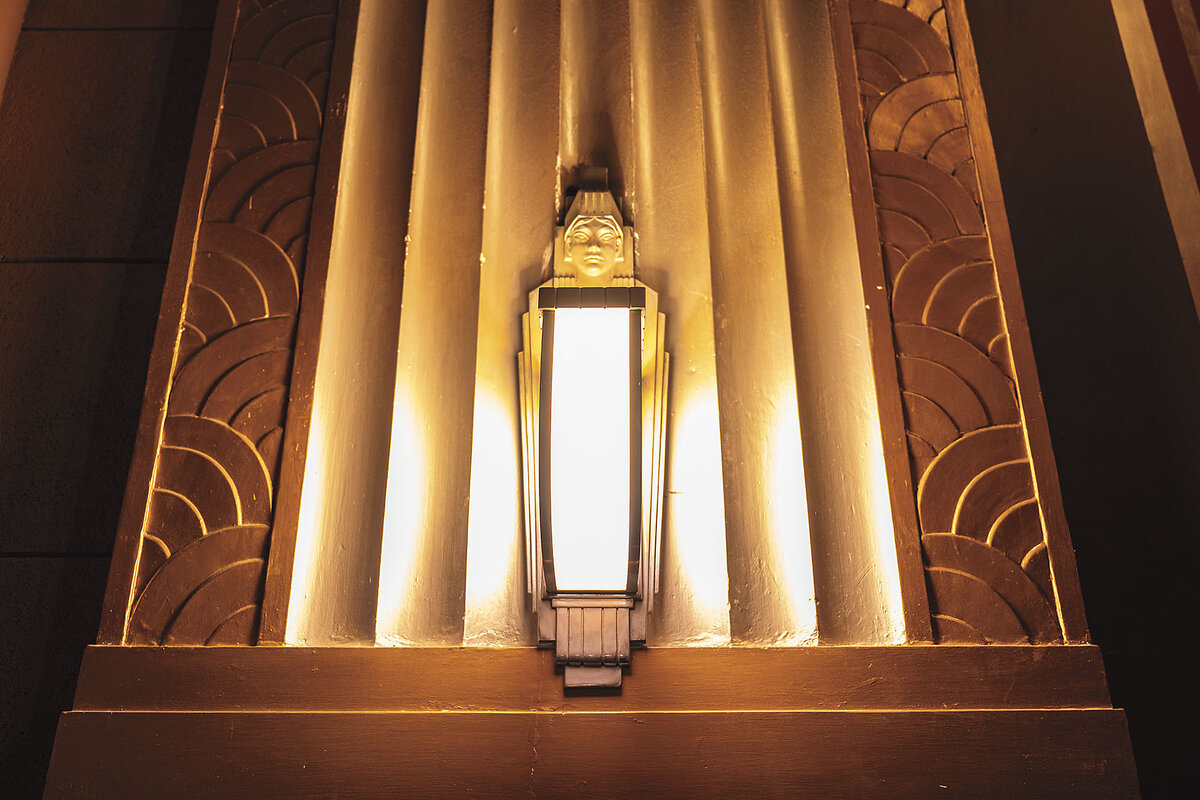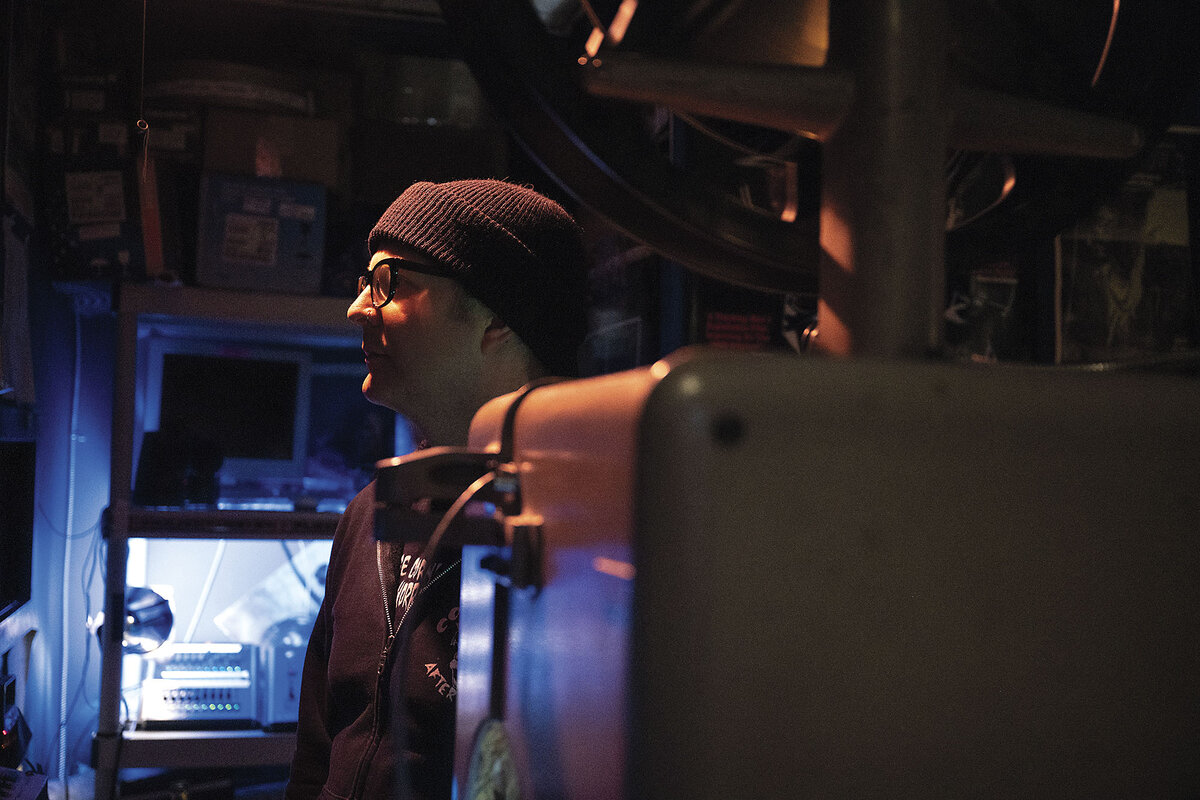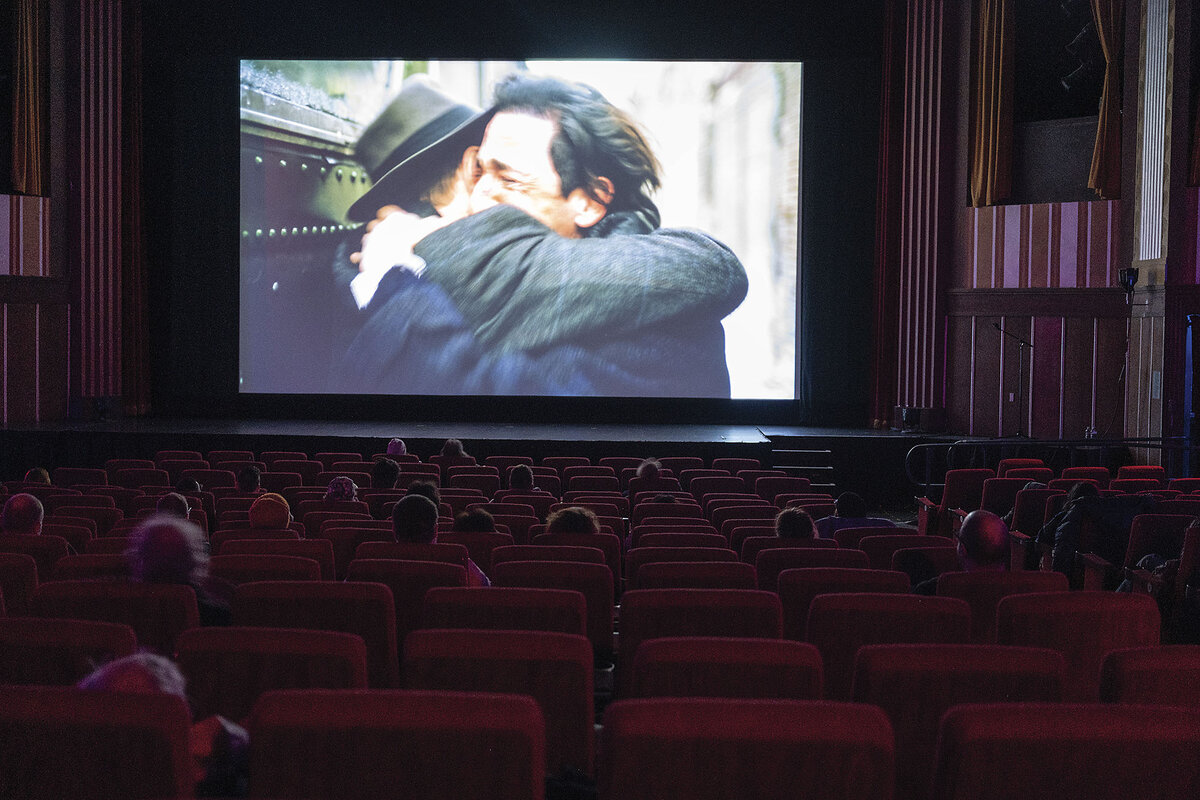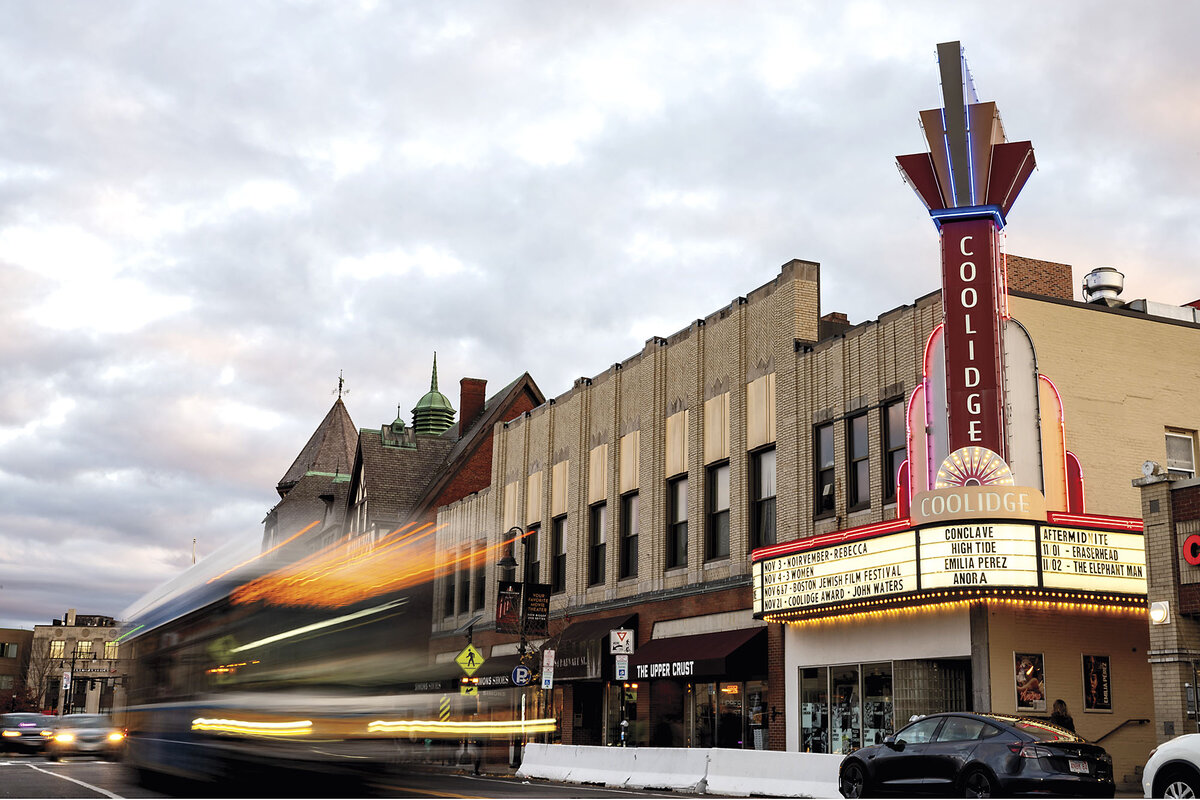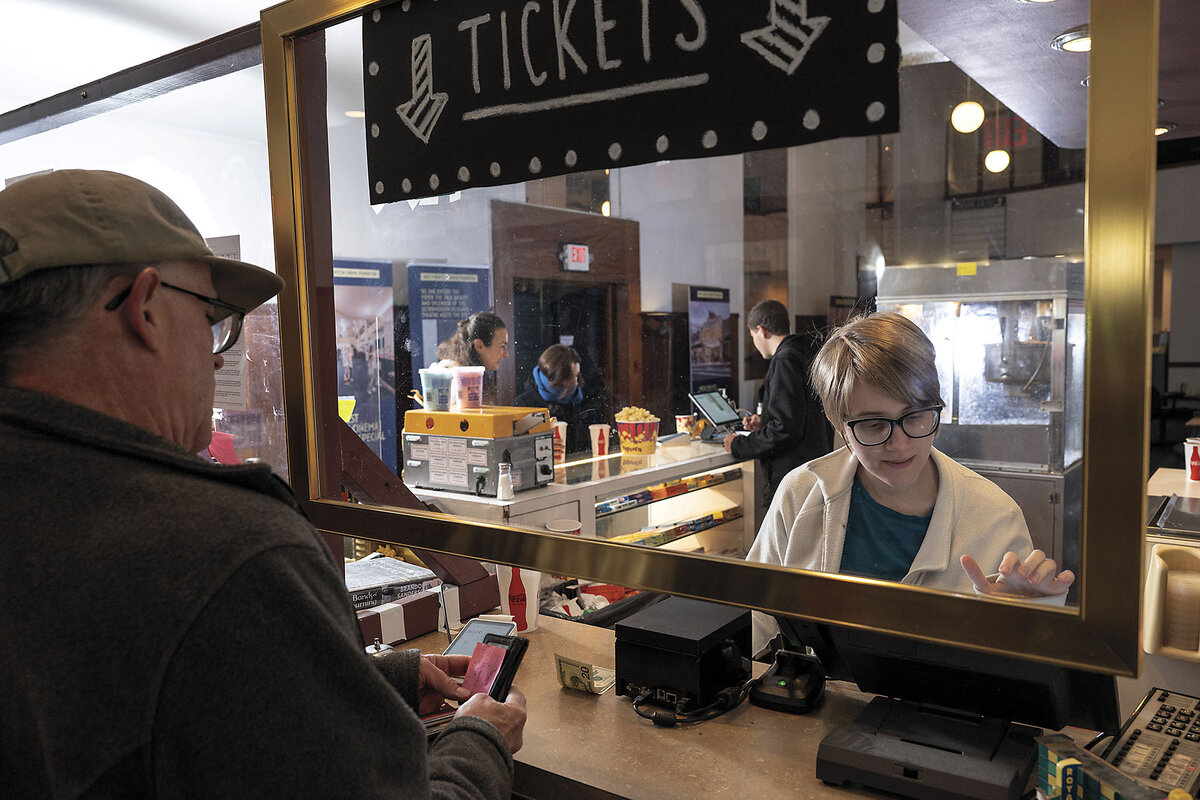‘I didn’t know I needed it.’ Why neighborhoods rally to save movie houses.
Loading...
| Newton and Brookline, Mass.
A man sitting two seats away from me at the West Newton Cinema is sobbing, again.
His long gray beard flows in convulsing waves to his shoulders. He, like me, is sitting alone here in this art deco-style theater not far from Boston. We are now in the third hour of the director’s cut of Giuseppe Tornatore’s 1988 Italian-language masterpiece, “Cinema Paradiso.”
The narrow upholstered seats are a bit uncomfortable. Mine tilts left slightly. They are nothing like the cushy stadium seats in chain theaters, which can serve as a buffer from interacting with strangers.
Why We Wrote This
Old-time community movie theaters have endured decades of challenges. Now, they may be one of the last bastions of affordable, joyful, civic engagement – even if you go alone.
Why are we here? Maybe it’s nostalgia. The West Newton Cinema opened in 1937 as a one-screen grand movie palace. Today, it feels thread-worn and tired. The theater’s about a third full, which is not too bad.
I’m feeling both uneasy and curious about my neighbor’s displays of emotion. They’ve been continuing since the opening scenes. But I’ve also been moved to tears by films.
There’s a scene in “Cinema Paradiso,” too, in which viewers watch an older man with a mustache and scruffy beard sob while he’s watching a film. Art’s imitating life right now, and I feel like a character.
The film is about love and nostalgia. A famous (fictional) Italian director recalls his past. Scenes flash back to a magical time when, as a little boy in love with movies, he became the unlikely projectionist for the Paradiso. He grows into a handsome teen who falls in love with a beautiful girl. But after he must leave for military service, she moves away, and he can’t find her when he returns. Now a beloved auteur, he still yearns for her three decades later.
There are a number of annoying plot twists that weren’t in the original 1988 release, which won the Oscar for best foreign language film. (And which is far, far superior to this director’s cut.)
But one notable scene remains the same: The townspeople of the fictional Giancaldo, partly filmed in a dusty location in Sicily, assemble to watch their historic but neglected Cinema Paradiso theater fall to dynamite.
As it explodes, my neighbor lets out a long sigh of despair.
Movie lovers unite around quirky independent cinemas
There’s a quirky social ecosystem of cinephiles around the United States. You may know some of them. They often insist that “a film” is different from a movie or that “a cinema” is very different from a Cineplex.
Like audiophiles with their vinyl records and analog speakers, cinephiles prefer the look of 35 and 70 mm film projected on a big screen – preferably framed in a dimly lit art deco-style room.
They are projectionists, documentary filmmakers, and movie critics. They are also cinema managers, philanthropists, and theatergoers, like me, committed to preserving a unique cultural experience in an era that demands, “Go digital or go dark.”
Last year, local cinephiles launched an effort to save the West Newton Cinema from a developer’s wrecking ball. The property had included a clause that stipulated a nonprofit could purchase the theater for $5.6 million anytime before Aug. 10, 2024. So they set up a foundation and started to raise funds.
An anonymous donor contributed $5.2 million in April, and the foundation eventually raised enough to make the purchase days before the deadline.
It was a spontaneous decision to see “Cinema Paradiso” at this historic theater. I had been following the West Newton’s efforts to save itself, and one day last summer I happened to visit its website for an update.
As it turned out, the well-known film critic Ty Burr was going to be there that evening to host his first movie club screening to help reach the fundraising goal. He was showing “Cinema Paradiso” and then leading a discussion afterward.
It caught my attention. For decades I’ve gone to see movies at the Coolidge Corner Theatre, an independent cinema and cultural center in Brookline, Massachusetts. It specializes in showing international and independent movies – on real film. It nearly closed its doors for good in 1988. But it was saved, too, through an outpouring of community support.
I had also seen “Cinema Paradiso” about 30 years ago and knew it was a film about love and longing – as well as a passion for cinema itself. I even thought I might experience a kind of “meta moment,” witnessing the rebirth of a movie theater as I watched a movie about the death of one.
I called my husband and said I would be home late. This journalist was going to the movies alone.
Can community cinema survive the streaming revolution?
Twenty-five years ago, the social scientist Robert D. Putnam suggested in his book “Bowling Alone” that Americans were becoming more and more disconnected from each other. The social cohesion that once held communities together was losing its grip.
We are doing a lot alone. Churches are emptying. Volunteering across the U.S. continues to drop. Engagement in civic society is in peril, recent reports say.
Attention spans, on a diet of TikTok and social media videos, are shortening. The pandemic and a fear of gathering in public have supercharged a decadeslong trend of cocooning at home. And as Netflix and other content providers stream movies 24/7, fewer people are going to the movies.
As a Forbes headline asked last June, “Is the death of movie theaters upon us?”
At first, the pandemic offered me a rare opportunity to make our house both my center and circumference. The pressures of battling the daily commute were gone. Volunteer activities and church attendance changed from showing up to joining, or leaving, a Zoom call when I felt like it.
I had more time to reflect, linger over a puzzle, read books for pleasure, dig a new garden, and give longer, unhurried attention to projects. Sometimes the family gathered to stream a movie together – while scrolling on our phones.
Soon enough, as we were driven apart by different tastes, bedtimes, and laptops that could be carried into bedrooms, I started watching movies by myself, sometimes for hours. We all did. Even though working full time, I felt like I had retired from civic life into a world I created.
Something felt off.
I didn’t know then that I missed going to the movies. I didn’t know I needed to gather with strangers in the dark and hear them laugh at the parts I found funny, too, or watch them wipe away tears.
I didn’t know why until I showed up again. And after the journalist in me decided to explore this enduring part of American culture, I discovered that its decline is only part of the story. There are signs that many people, even young people, are starting to rediscover cinema.
“The eulogy for movie theaters and movies has been written and rewritten for 100 years,” says Ross Melnick, professor of film and media studies at the University of California, Santa Barbara. “We go through these periods where people think no one’s going out. And then all of a sudden, everyone’s at the movie theaters, and you can’t get a ticket.”
The nonprofit Art House Convergence, a national arts service organization serving independent cinemas, released a report last summer that revealed attendance at local independent theaters is nearly back to 2019 numbers. Their audiences are now younger, more diverse, and hungry for independent rather than big studio content.
Art house theatergoers, too, go to see movies more than twice as often compared with general moviegoers, a recent study from Harvard’s Shorenstein Center found. It also estimated there is an untapped market of 40 million viewers hungry for independent film. In another survey, the National Association of Theatre Owners found that 85% of moviegoers plan to go to the movies in 2025 as often as or more than they did in 2024.
A movie ticket has proved time and again that it is a relatively affordable and accessible way to connect with new people and new ideas, says Sarah Keller, author of “Anxious Cinephilia: Pleasure and Peril at the Movies.”
“I think it’s one of the deepest experiences of the humanities to go to the movies,” Ms. Keller says. “You’re sort of forced to confront all kinds of issues that maybe we prefer to have more control over. And if you go to the movies, and you don’t have that control, you are subject to the whims of what the film is doing.”
I was missing that. We see ourselves on big screens in the dark. We face our fallibilities and terrors. We remember our love, anger, and deep sorrows. We see our hopes and the beauty around us. It’s a different kind of experience.
Or, as Dr. Melnick said to me, “If you have the right movie theater experience, everyone puts away their phones. You’re in this kind of unique public collective in which everyone makes a social contract that we’re all going to just experience this.
“And yet we are reactive to each other’s laughter and fears, even that sucked-in breath at the end of a climactic and frightful moment. ... The film itself is working to connect you and hold you for two hours – if you let it.”
For the love of real film: Inside the projection booth
“Cinema Paradiso” has numerous scenes set in a dark projection booth. The main character, as a boy, is obsessed with physical strips of film, using them as playthings. Though I’ve been going to see films at the Coolidge Corner Theatre since I was in my 20s, I’ve never been in the projection booth. Now it’s two minutes to midnight, and I’m next to the cinema’s lead projectionist, Thomas Welch, as he gets ready to load a reel of film.
He’s moving quickly, preparing 35 mm film reels for two aging Norelco AAII Universal projectors.
He turns on the lamps. Check. He pulls the end of the film from the reel and threads it through the projector head, over the rollers and sprockets, and then into the gate, which is directly behind the lens. Check. He then laces the film through the sound head and into the takeup reel.
It’s hot in here with little circulation and the heat of the lamps. I straighten myself near a small counter, its surface a tangle of wires. Mr. Welch, dressed head to toe in black, zips between the two film projectors, making sure they are in sync.
He pauses to perch on a padded stool to peer through a tiny port window and gaze out into the theater 20 feet below. About 25 people are here for the midnight showing of a weird John Waters film, “Desperate Living.”
There’s a third projector, a much smaller digital machine. This is for the trailers and ads. He starts this one by pushing a button. Then, at 12:04 a.m., the first feature reel spins to life.
“I spend a lot of time in a dark room by myself,” Mr. Welch says above the tick-tick-tick of the film passing through locks. His goal is to remain a specter, unseen and unknown.
But his job isn’t done. After 18 minutes, he peers through the port to watch for a black markerlike smudge to appear in the upper right corner of the movie on the screen – his visual cue to start the next projector motor and seamlessly transition to the second projector. He has six seconds after he sees the cue.
Then he has to remove the finished reel from the first projector and load it onto the motorized rewind bench. Lifting the next 7-pound reel above his head, he fastens it onto the projector and again laces the film through the locks. He’ll do that four more times until the credits roll at 1:30 a.m.
It’s true. Cinephiles can be a bit elitist about their preference for movies on film. And certainly, sometimes this is just a pose when some claim to find such a meaningful difference watching film, like those who declare that listening to a song recorded on vinyl has more soul than one burned onto a CD.
But watching movies shot and presented on physical film can add layers of nostalgia, history, and meaning, says Ian Brownell, a board member of The Brattle Film Foundation in Cambridge, Massachusetts.
He compares watching a favorite movie shot on film in the theater to being a groupie. “When you go to see a band, you might know all the songs, so it’s really a question of, How good was the band that night, and how great was the audience, and how great was the venue?” Mr. Brownell says.
“So you might see a film that you’ve seen 10 times before, and you’re like, yeah, it was in the small theater, the audience wasn’t really great, and the print was kind of beat up,” he says. “Or, oh my God, it was amazing. It was sold out, lots of first-timers; everybody loved the movie; and the print was just unbelievable.”
He also points out that a new generation of college students and young professionals, just like generations before, is discovering the repertory of great films in the distant or recent past. This includes Ken Yin, a young professional videographer and a regular at the Coolidge Corner Theatre.
“When you sit at home [to watch a movie], you can have millions of distractions,” says Mr. Yin, who went alone that night.
“Going into a cinema is like – I’m not sure how to describe it in English, but in Chinese, we have this word for a feeling of ceremony, like a ritual, for focusing on what you are doing, what you are experiencing, for the good of the thing itself.”
“We will always run a movie if someone shows up.”
The former owner of the West Newton Cinema, David Bramante, still loves this place and remains a presence. He agrees to meet for a tour of its screening rooms.
He points out various changes since he bought the cinema in 1978 with his brother, Jim. It has been a part of the community for almost 90 years. A single-screen theater for decades, it was renovated to become a triplex in 1967.
The Bramante brothers expanded the theater a couple of times, adding the art deco flair and three more screens, for a total of six today. Their cat, Annie Hall, used to stroll the cinema aisles until she caught customers by surprise when she leaped into their laps.
We pass through a projection booth showing “Sing Sing” to a single audience member. “We will always run a movie if someone shows up,” Mr. Bramante says.
He still says “we,” I note. But when audience numbers plummeted during the pandemic, he knew it was finally time to sell. The cinema’s new board of directors now stewards the next daunting challenge of raising $14 million to make necessary repairs and improvements, including more comfortable seats.
We head back to the lobby where Jesse Cerrotti, the new 30-something cinema manager, is pivoting between his tasks.
He works seven days a week at the theater, he says, juggling birthday parties and events accompanied by Grace, his blind black-and-white dog. Grace waits for him in his office now, surrounded by film posters.
“I’m exhausted,” Mr. Cerrotti says with a smile. He turns to help a young local filmmaker use a flash drive to project her movie on a screen. Then he assists a worker at the concession stand struggling to replace the carbon tank behind the soda machine.
Mr. Cerrotti is also optimistic. He notes the theater is trying to expand its audience to include high school and college students.
“We are continuing to provide unique independent films, foreign films, smaller independent films that you’re not going to get at some of the larger [multiplexes].”
A regular customer complains to the young woman at the cash register about the recent price hike in senior tickets. At the moment, most of his devoted clientele are retirees from the immediate neighborhood.
“The most important thing for me is that we don’t lose any of the community that’s already built,” Mr. Cerrotti says.
Revisiting “Cinema Paradiso” with Ty Burr’s Movie Club
I am at the inaugural meeting of Ty Burr’s Movie Club, led by the writer and Washington Post film critic. After the credits of “Cinema Paradiso,” the lights flicker on, and Mr. Burr asks the audience, Who has seen both versions, and which cut did you like better?
A film teacher shares that she has shown both versions to her high school students. The boys love the shorter version, she says, but the girls love the director’s cut, in which the main character does find his lost love – only to learn she married a high school rival.
Another attendee waxes poetic about the cinema’s town square as a metaphor for life’s changes.
It does feel meta. Everyone in the group, myself included, is being recorded by the filmmaker Anne Continelli, who is making a documentary about communities trying to save their cinemas.
I ask Mr. Burr why he chose “Cinema Paradiso” as the first film for his movie club. At the time, the deadline to save the property from being turned into new apartment buildings still loomed.
“Sitting here tonight, I can’t help but think what might happen to this theater,” Mr. Burr says. “Movies have been dying for as long as I have been alive. And yet, here we are. We have a primal need to gather together and tell stories. Sitting at home clicking through Netflix or binge-watching ‘The Bear’ doesn’t satisfy that urge.”
I also chat with an artist who goes by B. Amore, a grandmother who founded a sculpture center in Vermont. She had recounted during the discussion her own late-in-life encounter with an Italian boyfriend from her youth.
She’s been attending the West Newton Cinema since the late 1970s, she tells me. She raised a family here but then moved to Vermont, where she now lives alone. But she regularly returns to the area, she says.
It’s important in the current political and cultural climate to find shared spaces where people can listen to each other, she says. The nuance often found in the films shown at the West Newton stirs people to think.
“It’s in that depth and the complexity of what is presented that people are encouraged to think more independently,” Ms. Amore says. “And I think we have a problem in this country with people not thinking independently enough and becoming polarized in different positions without really considering the multitude of options in between the two poles.
“We need much more of that kind of influence in our lives to keep us more open to each other.”
I notice the man with the flowing gray beard. He stayed for the discussion, too. But here he was quiet, engaged but aloof. Going to the movies alone is so complex, I think. It feels daring and anonymous, risky and safe, at the same time.
I watch him as he leaves the theater, making his way through the lobby and into the dark night alone.
Monitor intern Mackenzie McCarty contributed to this story.
Editor’s note: This story, originally published Feb. 27, has been updated to reflect the full scope of Art House Convergence. It is a national arts service organization serving independent cinemas.






